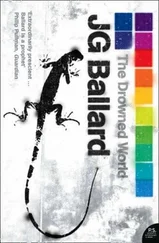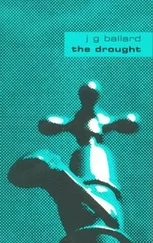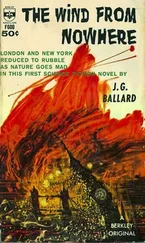‘Jamie, you stupid …!’
I pedalled away from them into a wall of noise and smoke. Glass was falling from the windows of my father’s building in Szechuan Road. Office girls darted from the doorways, their white blouses speckled with fine needles. My front wheel jolted over a piece of masonry shaken loose from a cornice. While I straightened the pedals a low-flying bomber veered away from the Japanese anti-aircraft fire. It flew above the Bund, exposed its open bombing racks and released two bombs towards the empty sampans moored to the quay.
Eager to watch the water-spouts, I mounted my cycle, but a pair of powerful hands gripped my armpits. A uniformed British police sergeant whirled me off my feet. He kicked away my cycle and crouched by the steps of the Socony building. As he held me against his hip the metal hammer of his revolver tore the skin from my knee.
Exploding debris burst between the hotels and department stores of the Nanking Road and filled the street with white ash. A wave of burning air struck my chest and threw me to the ground beside the sergeant. Chinese office workers with raised hands ran towards us through the billows of dust, blood streaming from their foreheads. One of the stray bombs had fallen into the Palace Hotel, and the other into the Avenue Edward VII beside the Great World Amusement Park. The buildings in the Szechuan Road rocked around us, shaking a cascade of broken glass and roofing tiles into the street.
Beside the kerb a matronly Eurasian woman stepped from her car, blood running from her ear. She touched it discreetly with a silk handkerchief as the police sergeant propelled me towards her.
‘Keep him here!’ He jerked my shoulders, as if I were a sleeping doll, and he were trying to wake me. ‘Lad, you stay with her!’
When he ran towards the Nanking Road the Eurasian woman released my hand, waving me away and too distracted to be bothered with me. Blood seeped down my leg, staining my white socks. Looking at the thin trickle, I noticed that I had lost one of my shoes. My head felt empty, and I touched my face to make sure that it was still there. The explosion had sucked all the air from the street and it was difficult to breathe. Gesturing to me in an absent way, the Eurasian woman wandered through the debris, wiping the dust from her leather handbag. The blood ran from her ear as she stared at the broken glass, trying to recognise the windows of her own apartment.
Far away, police sirens had begun to wail, and an ambulance of the Shanghai Volunteer Force drove past, the glass spitting under its tyres. I realised that I was deaf, but everything around me was deaf too, as if the world could no longer hear itself. Two hundred yards from the Great World Amusement Park I could see that most of the building had vanished. Smoke rose from its exposed floors, and an arcing electric cable sparked and jumped like a swaying firecracker.
Hundreds of dead Chinese were lying in the street among the crushed rickshaws and burnt-out cars. Their bodies were covered with white chalk, through which darker patches had formed, as if they were trying to camouflage themselves. I walked among them, tripping over an old amah who lay on her back, pouting face covered with powder, scolding me with her last grimace. An office clerk without his arms sat against the rear wheel of a gutted bus. Everywhere hands and feet lay among the debris of the Amusement Park – fragments of joss sticks and playing cards, gramophone records and dragon masks, part of the head of a stuffed whale, all blanched by the dust. A bolt of silk had unravelled across the street, a white bandage that wound around the lumps of masonry and the mislaid hands.
I waited for someone to call to me, but the air was silent and ringing, like the pause after an unanswered alarm. I could no longer hear my feet as they cracked the blades of broken glass. I walked back to the Hunters’ Lincoln Zephyr. The chauffeur stood in his pallid uniform by the open driver’s door, brushing away the dust that covered the windshield. David sat alone in the back, hands pressed to his mouth. He ignored me and stared at the torn seat-cover with fixed eyes, as if he never wanted to see me again.
I looked through the broken windows at Nurse Arnold, who was lying across the front seat. Her hair fell across her face, forced by the explosion into her mouth. Her hands were open, white palms exposed, displaying to any passer-by that she had washed them carefully before she died.
Later, when he visited me in Shanghai General Hospital, David asked me about the blood on my leg. Curiously, this was the only blood that he had seen on Bloody Saturday.
‘I was wounded by the bomb,’ I told him.
I had begun to boast in a small way, but more truthfully than I realised. One thousand and twelve people, almost all Chinese refugees, were killed by the high-explosive bomb that fell beside the Great World Amusement Park. As everyone constantly repeated, proud that Shanghai had again excelled itself, this was the largest number killed by a single bomb in the history of aerial warfare. My own trivial injury, caused by the police sergeant’s revolver, numbered me among the thousand and seven who were wounded. Although not the youngest of those injured, I liked to think that I was No. 1007, which I firmly inked on my arm.
Months of fierce fighting took place around the International Settlement before the Japanese were able to drive the Chinese from Shanghai, during which tens of thousands of soldiers and civilians were to perish. But the Avenue Edward VII bomb, dropped in error by a Chinese pilot, had a special place in the mythology of war, a potent example of how mass death could now fall from the air.
At the time, as I rested in my bed at Shanghai General, I was thinking not of the bomb beside the Amusement Park, but of my army of toy soldiers on the floor of my playroom. Even as the rescue workers of the Shanghai Volunteer Force carried me to their ambulance through the dusty streets I knew that I needed to rearrange their battle lines. I had seen the real war for which I had waited so impatiently, and I felt vaguely guilty that there were no models of dead Chinese in my boxes of brightly painted soldiers. Now and then my ears would clear for a brief moment, and the eerie sounds of Japanese artillery drumming at the hospital window seemed to call to me from another world.
Within a few days, however, my memories of the bombing had begun to fade. I tried to remember the dust and debris in the Szechuan Road, but the confused images in my head had merged with the newsreels I had seen of the Spanish civil war and the filmed manoeuvres of the French and British armies. The fighting in the western suburbs of Shanghai veiled the window with curtains of smoke which the autumn winds drew aside to reveal the burning tenements of Nantao. The nurses and doctors who tested my ears with their tuning forks, Olga and my school-friends, my mother and father on their evening visits, were like actors in the old silent films that David Hunter’s father screened for us against his dining-room wall. The bomb that destroyed the Amusement Park and killed more than a thousand people had become part of those films.
It was three months before I could go back to Amherst Avenue. Artillery shells from the rival Chinese and Japanese howitzers at Siccawei station and Hungjao were passing over the roof of our house, and my mother and father had moved to an apartment in the French Concession. The battle for Shanghai continued around the perimeter of the International Settlement, shaking the doors of our apartment and often jamming the elevator. Once Olga and I were trapped for an hour in the metal cage. She, who was usually so silent, spent the time delivering a torrent of words at me, well aware that I could hear not a single one. I often wondered if she was accusing me of starting the war, though in Olga’s eyes that would have been the least of my crimes.
Читать дальше









